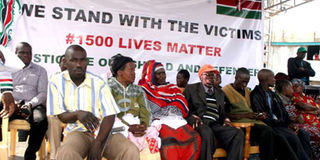Misery of post-election violence is certainly no laughing matter

Kibera residents gather at Kamukunji grounds on April 16, 2016 to commemorate lives lost during the post-election violence in 2007. Some work has been done to compensate some survivors. PHOTO | ROBERT NGUGI | NATION MEDIA GROUP
What you need to know:
- The Waki Commission estimated that 1,133 people were killed by the time of writing their report, as gathered from mortuaries and hospitals.
- I don’t know if Mr Kenyatta has met survivors of PEV beyond issuing title deeds or cash compensation to some favoured few.
Following Mr Uhuru Kenyatta’s recent joke in Uganda equating peaceful post-election protests in the US to our horrific post-election violence in 2007/8, we clearly need reminding about what actually happened in 2007/8.
As time passes on, and as some dance on the graves of the thousands of victims — laughing at the pain, suffering and horror of survivors — we must resist turning our history upside down.
Mr Kenyatta wrongly termed the peaceful protests in the US as “violent demonstrations,” adding slyly that he was “tempted to look for Fatou Bensouda to put the case against post-election violence in the United States”.
He followed with a deep chuckle, as the guests applauded (see https://www.youtube.com/watch?v=SZtJwvh-Ge8&feature=youtube).
That he can make fun of our post-election violence is unnerving as it is disturbing.
Had he cared to follow the news — even television news since he has a disdain for reading — he would have found that the post-election protests in the USA have largely been peaceful despite the anguish and anger from thousands whose “losing” candidate had 2 million more votes than the declared winner.
Significantly, US security forces facilitated the protests, understanding the need for people to vent their frustrations.
We could have significantly reduced the carnage of 2007/8 had the authorities understood that people need to vent their rage peacefully rather than attack with live ammunition.
A sizeable number of the deaths, injuries and rapes from 2007/8 came at the hands of the police, who escaped accountability, making them more dangerous now.
SERIOUS CRIMES
But let’s get the facts straight.
The Waki Commission estimated that 1,133 people were killed by the time of writing their report, as gathered from mortuaries and hospitals.
The deaths came from shootings by police, burnings, slashing and spearing.
And there were also cases of devilish mutilations and beheadings.
Some of the dead were protesters out in the streets venting their anger at the clear rigging of the elections in Eldoret, Kisumu, Kericho and Nairobi.
They were shot by the police, and included bystanders caught by “stray” bullets as they watched from the sidelines or in and around their homes.
Then there were the Gikuyu and Luo burnt to death, in Eldoret and Naivasha respectively, by thugs representing the different sides of the political divide.
There were also the mutilations and beheadings, including forced circumcision by Mungiki in a manner that was planned with precision, and specifically targeted at Luos in Naivasha, Nakuru and parts of Nairobi.
Lastly there were those who were slashed and speared to death mainly around the Eldoret area and in parts of Nairobi.
The Waki Commission did not account for the hundreds injured who later succumbed to their deaths, or the thousands who contracted HIV-AIDS from the gang rapes that were common in all the conflict areas, including rapes by kinsmen and neighbours.
It is impossible to know how many of these women — and men — are still alive following these rapes.
I don’t know if Mr Kenyatta has met survivors of PEV beyond issuing title deeds or cash compensation to some favoured few.
But it would help him to meet Mary Macharia, whose baby was burnt alive in the Kiambaa church and whose debilitating injuries forced her husband to become her fulltime care-giver.
HISTORY
He could meet the family of Dorothy Auma, who died in October 2011 after a life of abject misery after her gang-rape in Naivasha in December 2007.
Then he may understand the pain that hundreds of survivor women go through each day, eking out a living without support or recognition.
I am sure Maurice Opondo in Kisumu, whose arms were chopped off in Ruiru — so that he now needs help to urinate — could teach him something about PEV and peaceful protests.
Or the men whose genitals were chopped off in crude attempts to forcibly circumcise them.
Some work has been done to compensate some survivors.
But that has come after massive pressure, and with such bias and partisanship that it makes Mr Kenyatta’s joke cruel in the extreme.
Just ask the forgotten IDPs in Nyamira and Kisii who have resorted to demonstrations to simply be recognised as IDPs.
It may seem funny to laugh off our PEV now, but fate and history have their ways of haunting us.





